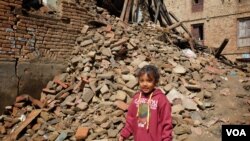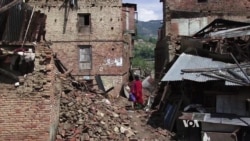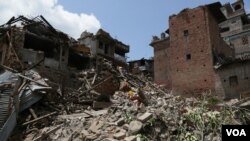Officials in Nepal are conceding “weaknesses” in managing the country’s earthquake relief operations, but vow the situation will improve in the coming days. Since Saturday’s 7.8 magnitude earthquake, authorities have struggled to reach communities outside of the capital city, Kathmandu.
Among those who wish help had arrived sooner are residents of Sankhu, a community of 10,000 people about 18 kilometers east of the capital. Locals estimate their community lost more than 80 percent of its buildings in the earthquake.
But residents say the vast majority of the town was spared because the adults were working in the fields, and children were playing when the quake struck at midday. Residents say 81 bodies had been pulled from the rubble by Wednesday.
Devastation
A group of Nepalese army soldiers arrived in Sankhu a few days ago, but quake survivors who have lost everything criticize the government's efforts as token.
"We’ve not received from the government any help worth mentioning. Just some tarps and little bits, here and there. But there’s been no big package of help,” says Pushkar Dangol, 52, whose house was reduced to rubble.
Colonel Govind Chettri of the Armed Police Force told VOA at Sankhu said he empathized with the frustration of locals who wanted more help to arrive sooner.
“I understand," he said. "Basically if I also put myself in their place that’s very common. But the way it has affected almost all other zones, other districts, other regions that are also there, we are trying our best despite the constraints.”
Foreign teams arrive
The first foreign teams with more sophisticated search equipment reached Sankhu on Wednesday, including a group of Chinese civilians who spent their own money to come to Nepal. The team, called “Blue Sky Rescue” from Guizhou province has been combing through rubble.
"Even being four days along maybe the chance is pretty rare right now, but we still have some very high hope to find a survivor,” said the Chinese volunteer group's spokesman, Wang Hengji.
Where the Nepal Army and the Chinese group were working together the focus is on finding a six-year-old girl who was eating lunch with her father when the quake collapsed their house. The father's body and those of five other family members were discovered earlier by local personnel. A frustrated uncle told VOA he is certain the teams were searching in the wrong part of the rubble.
"Her body is decomposed. The stench is coming from the other side. I told them but they are experts, they don't want to listen. I tried,"
said the man who did not want to give his name.
Other rescuers include a small number of French and Singaporean teams who are helping look for bodies.
Survival mode
A Sikh group from New Delhi, India, has brought in food and fresh water to set up a makeshift cafeteria at a school where families have gathered. In one room of the school as many as 22 people have taken up residence. Most others are in the fields under tarps held up by bamboo sticks.
Many Sankhu residents are anxious to dig out the grain stored in their shattered homes.
"My house has been destroyed," said Sunmaya Maharajan, 65, who was buried up to her neck in rubble until neighbors and police dug her out. "Now, where am I going to go? What am I going to do? What am I going to eat? There's a lot of worries here."
One of her neighbors, whose house was also destroyed, Pushkar Dangol, 52, characterized Nepal's government assistance as a token.
Many in the town with whom VOA News spoke are resigned to the fact their homes are destroyed and loved ones are dead. But they are anxious to get the rubble cleared so they can try to retrieve their precious grains. Otherwise, they say, they worry they will starve in the months ahead, after the relief agencies pack up and leave.
Some are not waiting around for help. Two sisters-in-law who have eight children between them were in a recently-harvested field scavenging for leftover or rotten potatoes. Both of their homes were leveled by the quake and they have been left with nothing but the clothes they are wearing.








